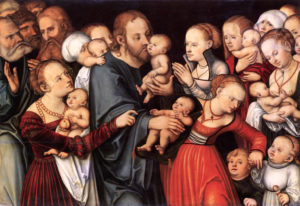Thoughts on Sunday’s Lessons for Sept. 23, 2018

Christ Blessing the Children (1535-1540). Painting on beech wood by Lucas Cranach the Elder (1472-1553). Städel Museum, Frankfurt, Germany. (Click image to enlarge.)
This reading seems to express an ancient, patriarchal view of woman’s subsidiary role in the household, an attitude that we hope the 21st century is leaving behind. Of course we should read the patriarchal language in both testaments as a signal of its own time and culture, not as guidance for the modern world. But read closely, and see that this capable wife is no shrinking, helpless figure. She has her husband’s trust; she supervises the household servants as she buys goods and food for the family and even purchases farm and vineyard fields. She is strong, brave, wise and kind. Her husband and her children praise her. “Let her works praise her in the city gates,” indeed!
First Reading (Track Two): Wisdom of Solomon 1:16-2:1, 12-22
Both good behavior and bad behavior have consequences. Righteousness is pleasing to God; evil deeds lead to death. We hear this theme in Sunday’s readings first in a reading from the book of Wisdom, which is traditionally attributed to King Solomon but was actually written in Greek in the last centuries before Christ. Most of Sunday’s reading, save for the opening and closing verses, presents the ungodly, arguing why they choose to persecute the righteous people who look down on them. They are wrong, of course, as the bracketing verses make clear: They don’t understand God’s purpose, nor do they recognize the rewards of a blameless life.
First Reading (Alternate Track Two): Jeremiah 11:18-20
Jeremiah is often called “the Weeping Prophet” for the loud lamentations that he shouts out to warn the leaders of Jerusalem and Judah that their failure of righteousness and justice is going to bring down God’s wrath in the form of defeat, destruction and exile. In these short verses, though, his weeping is more personal: He has learned that those leaders, angered by his prophecies, are scheming to kill him. He feels like a gentle lamb led to slaughter, he sings, but even in the face of enemies he remains committed to God.
Psalm (Track One): Psalm 1
We sang Psalm 1, the first of the 150 Psalms, in the weeks after Easter. Now we return to it again. We celebrate those who follow in the way of God, who delight in God’s teaching and meditate on it. These faithful souls will be happy, becoming as firmly rooted in faith as are trees deeply rooted by running water, gaining strength and bearing fruit. The wicked, in contrast, can count on no such happy end. Those who do not follow in God’s way will be blown away like chaff in the wind.
Psalm (Track Two): Psalm 54
This Psalm, attributed by tradition to King David, recalls a time when the young David, not yet the king, was forced to flee in terror from an angry, jealous Saul who sought to kill him. This narrative resonates with the reading from Wisdom: When insolent and ruthless enemies seek our lives, God’s laws will not hold them back. A time of fear is a time to pray, a time to call on God who delivers us from trouble and upholds our lives.
Second Reading: James 3:13-4:3, 7-8a
Picking up where last week’s reading from James left off, the author expands on the theme of guarding our tongues – tiny yet powerful instruments that they are – to praise and bless, not to poison. Contrasting the wisdom that comes from above with the envy and ambition in our hearts, he calls us to show our gentle, wise works in good lives, rather than engaging in earthly, unspiritual ambition and boasting. Resist evil, draw near to God, and God will draw near to us.
Gospel: Mark 9:30-37
Moving on to the end of the next chapter after last week’s reading, we find Jesus and the apostles back in Galilee after their foray into the Gentile country of Tyre and Sidon and Caesarea Philippi. When Jesus tells them for a second time that he must suffer, be killed and then rise again, they still don’t get it. Mark tells us that they’re even afraid to ask, perhaps remembering Peter’s embarrassment when Jesus angrily called him “Satan.” Now, when Jesus leaves them by themselves, they start arguing about which of them is the greatest. Jesus, who must have been thoroughly exasperated, shows them a small child. Following Jesus is not about greatness and power, he says. It is about serving others; it is about welcoming the smallest and weakest among us.
What are “Track 1” and “Track 2”?
During the long green season after Pentecost, there are two tracks (or strands) each week for Old Testament readings. Within each track, there is a Psalm chosen to accompany the particular lesson.
The Revised Common Lectionary allows us to make use of either of these tracks, but once a track has been selected, it should be followed through to the end of the Pentecost season, rather than jumping back and forth between the two strands.
For more information from LectionaryPage.net, click here.
